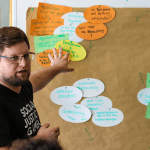Image is illustrative. Fredrick Tendong (Unsplash)
General trends of online communities
If Wikipedia is a library, then forums are social clubs for users. Online communities are home to many people, and provide a space for discussion, sharing and support. Their membership can vary greatly based on the specific community and topic. However, most online communities are self-organised, meaning that the members decide on the content, moderation and conduct within the community.
There are a few general trends throughout online communities, which overarch platforms. Most platforms have already adapted to the trend that users increasingly use visuals to communicate instead of texts. Whether it is short videos or boomerangs in messengers, a spacious cover picture for an article in a Facebook timeline or channel specific emojis on streaming platforms, why use words when you can use an image instead? Language in online communication has become much more visual. In addition, people are becoming increasingly aware of their privacy, in part due to the excessive data collection of the major platforms and also due to the Snowden revelations (The Guardian, 2019). This shows through their choice of platforms as well as the ways in which platforms are adapting to meet this need. Over the years, all messengers added end-to-end encryption to keep conversations between the users. Facebook was ordered to remove their real name policy in Germany in order to preserve a minimum degree of anonymity (Hern, 2018). At the same time, pseudonymised forums like Reddit or the chan-forums are flourishing.
Another trend is an explicit apolitical attitude that is conveyed in online communities. “Keep politics out of it” seems to be a slogan that resonates widely and picks up on resentment against antagonistic discussions on the web. However, it is merely makeup. Most communities hide their politics in humour and stereotypes, while quenching opposition to the accepted norms. This is not actually apolitical but rather a safe bubble of norms they feel comfortable in, while replicating the status quo (Jones, 2019). This trend has also been strategically picked up to promote reactionary politics. Under the cover of apolitical and/or non-partisan codes of conducts, agitators have actively spread fringe memes and introduced problematic messages, while condemning the politics of others (Dignam & Rohlinger, 2019).
Online communities are new, large social structures unlike anything known before. They support their members and are a safe haven for like-minded people. Users to a large degree can choose how open and vulnerable they want to be towards the community. The flip side of this is that these communities also have the potential to turn against people and serve as a coordination space for shitstorms or hate campaigns.
These communities are perhaps a space which digital youth work can step in to engage with hard to reach young people. As the communities often develop around topics or people from a certain region, they can facilitate specific and direct access to the target group.
Good practices of online communities
In order to start reaching out to online communities, consider the following good practices:
Don’t build anew, when it’s already there
Before you start yet a new forum, server or chat, check if it is already there. Reddit, YouTube and Facebook have communities for almost everything. Search for the keywords for your community and see what you find. Check in with your target group to see what services they use to exchange and check what is already there. Unless you have a genuinely new approach, try to work in existing communities first. If that fails, you can still use the outreach.
Make clear who you are and what you stand for
Dishonesty is frowned upon in the communities. When you enter, be clear who you are and why you are there. Many online communities will reject the notion of youth work. However, you might find open ears among some members. Explain what you bring and your connection to the topic.
Personal approach
Communities are all about relationships between members. Stick to the theme of the group, be relatable and be engaged. Do not pretend to be interested. The community you want to work with should revolve around a topic you can and want to contribute to. Like in traditional outreach youth work, share excitement for the subject of the community and use it as a conversation starter to bring in your experience.
Frequent updates
Online communication never stops. You will not be able to build a profile and relationship with the group if you are not present. Schedule online time and make sure to pick an active time in the group to connect with the other members. If you have a leading role in the community, make sure you keep the content going.
Co-develop a Code of Conduct
New communities, in particular, still need to find themselves and their tone. A similar situation can arise if the leadership changes or large portions of the group move in or out of the community. These situations can be used to renegotiate the terms of engagement within the community, as well as the norms and values it abides by. Try to create an open process to develop such a Code of Conduct collaboratively. Engage all members and try to empower the quieter members to create a more inclusive and active community.
In no way does this mean abolishing or replacing analogue offers of youth work. They serve the needs of their audience. The idea is to reach out to more young people and possibly engage them to take part in traditional youth work activities or create blended offers that respect the digital needs of young people.






